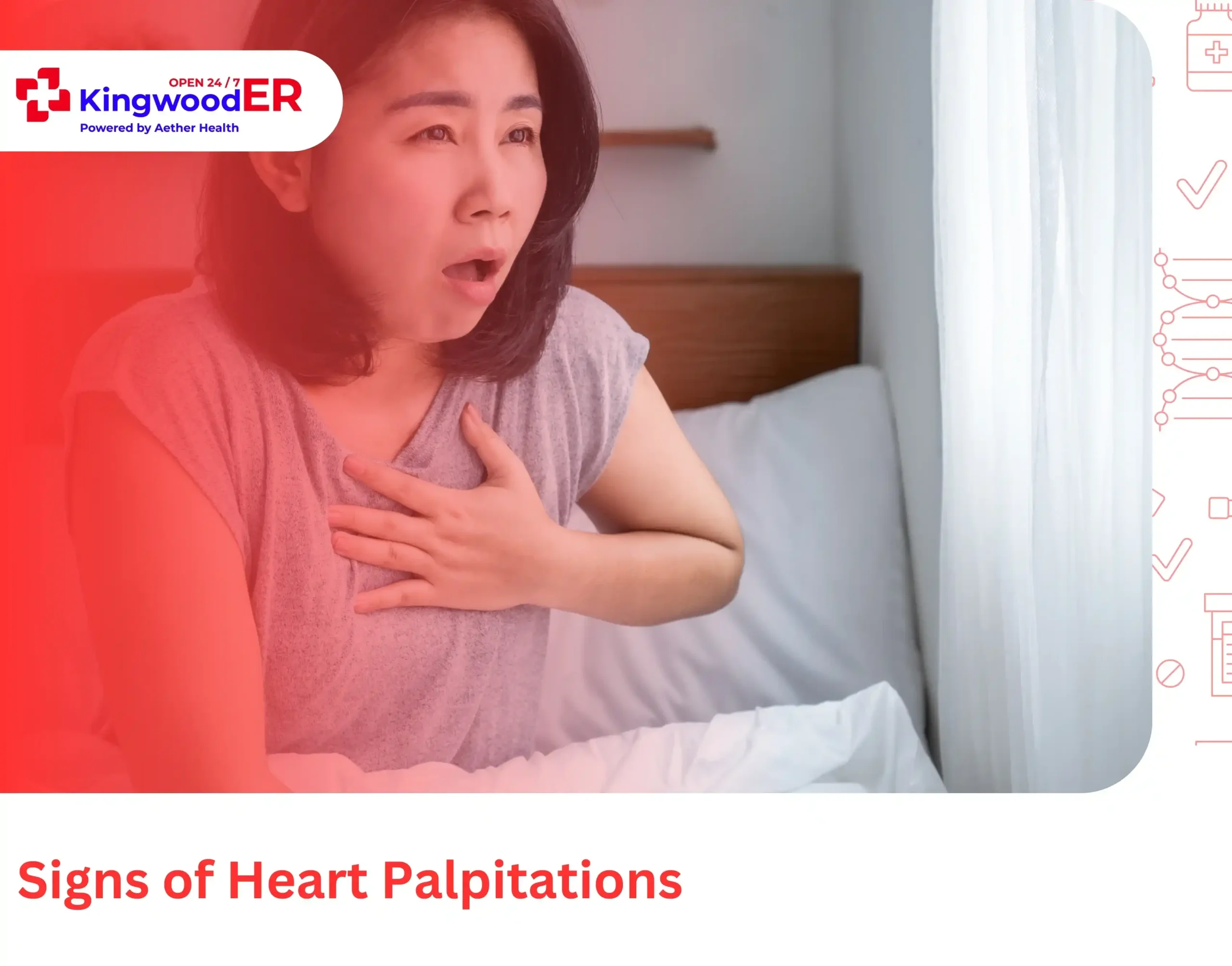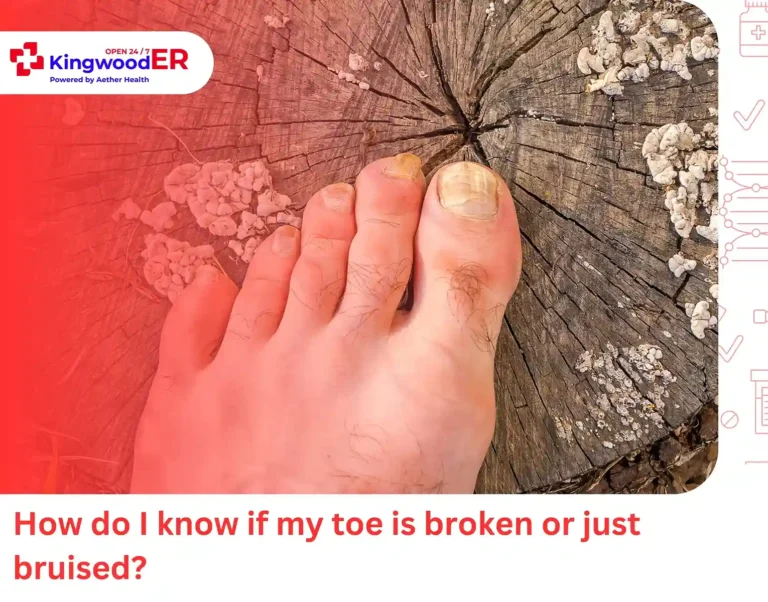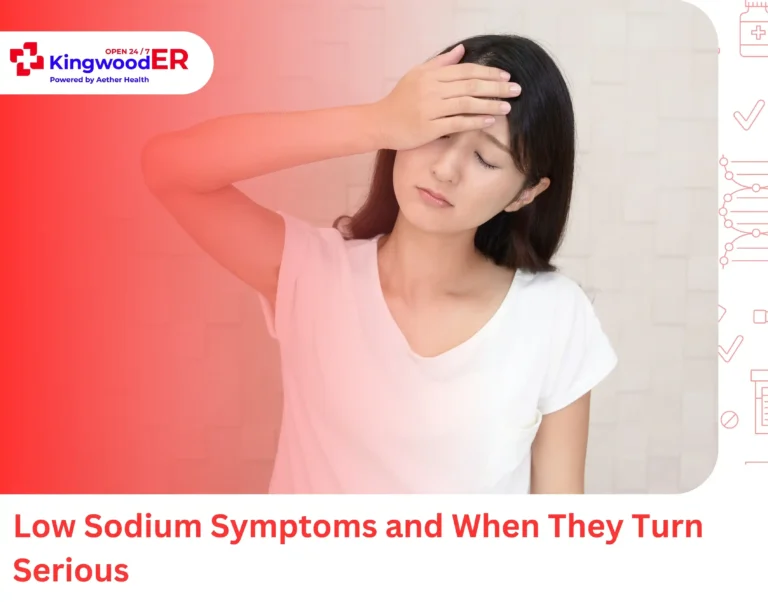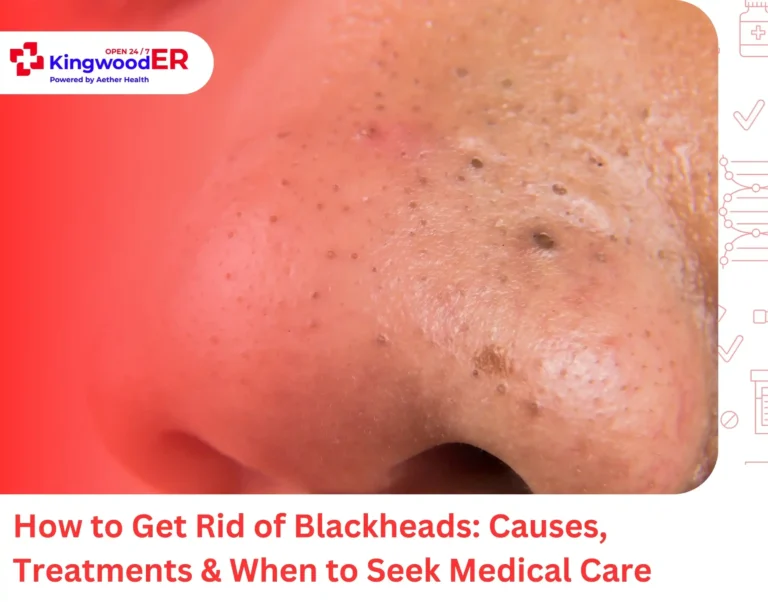Do you think all palpitations are the same? No, they’re not. For many people, they’re linked to stress or too much caffeine. But sometimes, they warn of serious heart conditions.
The tricky part is that palpitations often begin as harmless flutters, like your heart skipping a beat, pounding in your chest, or suddenly racing. But when they’re paired with dizziness, shortness of breath, or chest pain, it becomes a red flag that your heart is in danger.
Let’s explore a few important signs of heart palpitations that can help you separate harmless ones from serious warnings. This knowledge could one day save your life.
8 Signs of Heart Palpitations
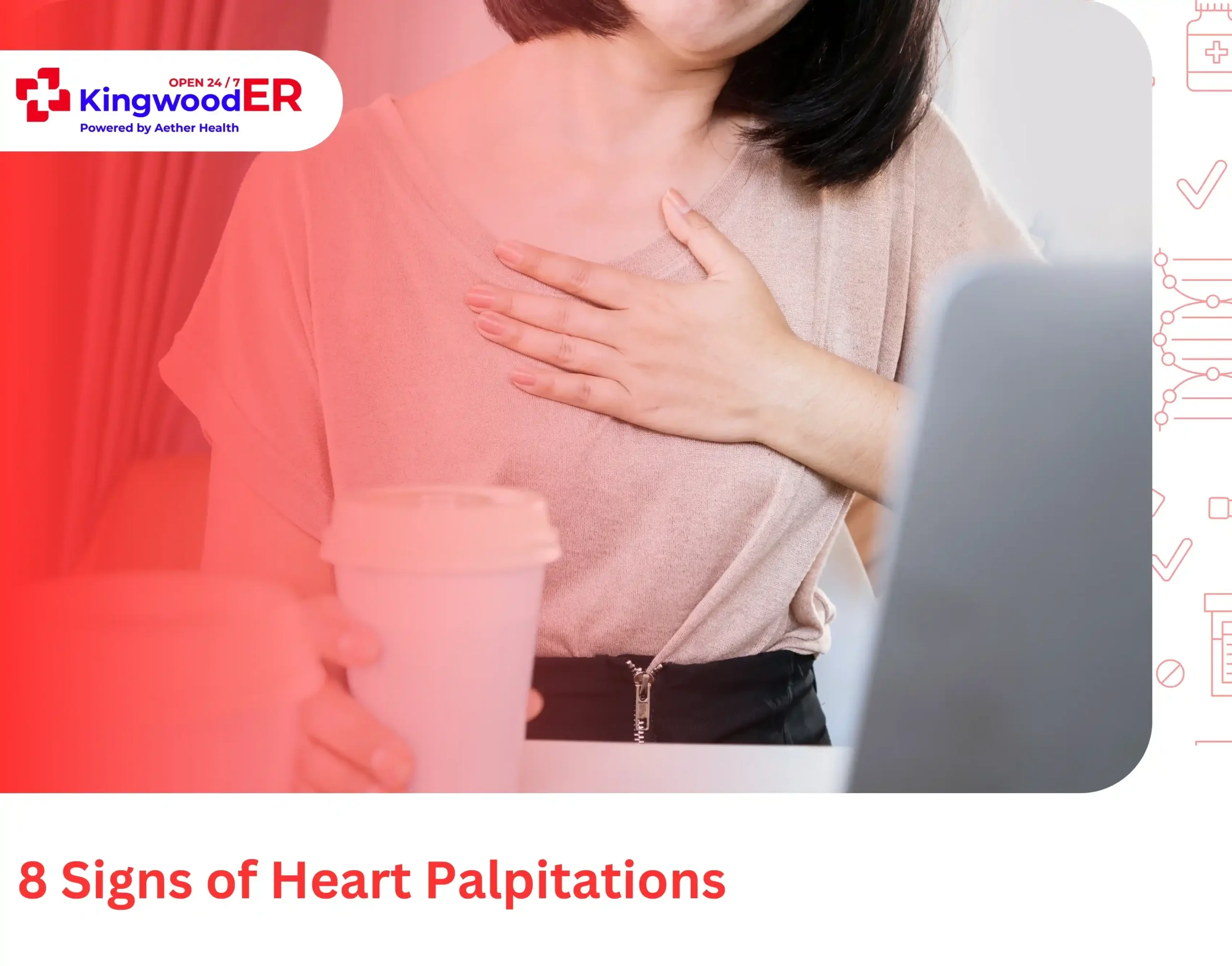
A heart palpitation is an abnormal awareness of your heartbeat. Normally, the heart beats rhythmically, and most of the time, you do not notice it. When palpitations occur, you suddenly become conscious of your heart’s activity.
Heart palpitations can feel different for everyone. Below are the most common signs people notice.
1. Racing Heartbeat
Your heart feels like it is beating much faster than normal, even if you are resting. This can be due to stress, caffeine, or exercise. But if it happens suddenly and doesn’t stop, it could be a sign of an abnormal rhythm.
2. Pounding Heartbeat
Some people feel strong, heavy thumps inside the chest. This can be scary, but it is often harmless. If pounding is accompanied by chest pain or shortness of breath, it may be a serious condition.
3. Fluttering or “Butterflies” in Chest
A light, quick fluttering feeling can happen when the heart beats irregularly. This is common with extra heartbeats or certain arrhythmias.
4. Skipped or Extra Beats
It may feel like your heart stops for a moment and then “catches up” with a strong beat. These are often harmless but can sometimes be linked to underlying heart problems.
5. Flip-Flopping Sensation
Some people describe palpitations as the heart tumbling or rolling inside the chest. This occurs when the heartbeat is irregular or uneven.
6. Palpitations Felt in Throat or Neck
Not all palpitations are felt in the chest. Some people notice a strong pulse in the throat or neck, which can be alarming.
7. Palpitations with Dizziness or Fainting
If your palpitations make you feel lightheaded, weak, or cause you to faint, it may mean your heart is not pumping blood properly. This is a red flag and needs emergency attention.
8. Palpitations with Chest Pain or Trouble Breathing
When palpitations come with pain, tightness, or pressure in the chest, or when you feel short of breath. It may be a sign of a serious heart problem, like a dangerous arrhythmia or a heart attack.
5 Signs That Heart Palpitations Are Serious
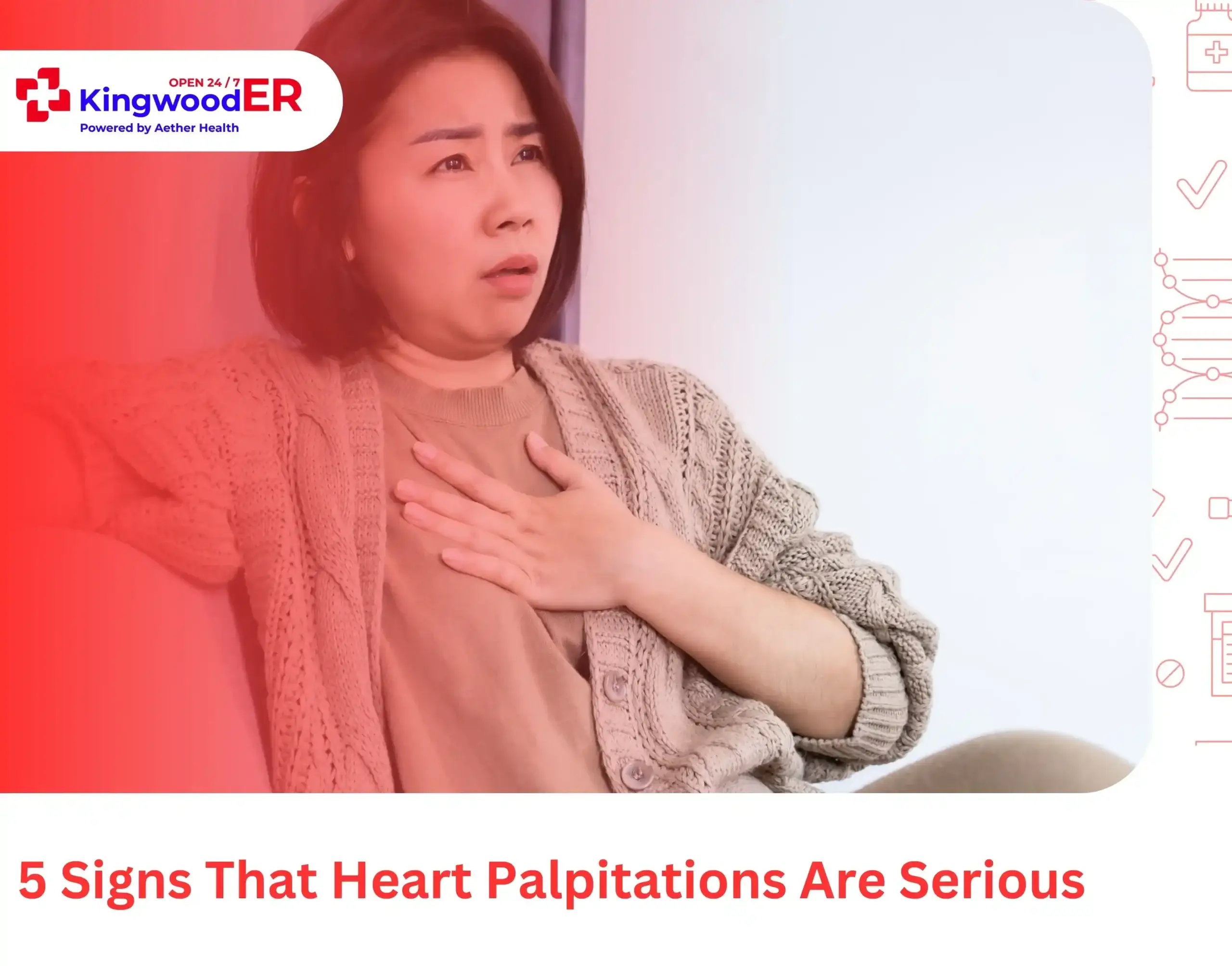
Not all signs of heart palpitations are dangerous, but some can signal a serious heart problem. Below are the warning signs that need immediate medical care:
- Chest pain or pressure
- Shortness of breath or trouble breathing
- Dizziness, lightheadedness, or fainting
- Nausea, sweating, or feeling as if about to pass out
- Palpitations that last longer than 30 seconds or get more frequent and intense
They are warning of heart conditions like arrhythmias (irregular heartbeat), tachycardia (when the heart suddenly beats too fast), or atrial fibrillation, which increases the risk of stroke.
Other Concerning Causes
Heart palpitations are more serious if they occur in people who already have:
- Heart disease, such as coronary artery disease, valve problems, or a history of heart attack
- Other medical conditions that can strain the heart, like cardiomyopathy (weakened heart muscle) or thyroid disease
Everyday Triggers That Can Cause Palpitations
Signs of heart palpitations can be triggered by everyday factors such as:
- Stress and Anxiety: The stress hormones make your heart beat faster or harder. That is why many people notice palpitations during stressful events or panic attacks.
- Caffeine, Alcohol, Chocolate, and Energy Drinks: These triggers are usually harmless but can cause noticeable palpitations in individuals who are sensitive to them.
- Heavy or Spicy Meals: Digestion requires more blood flow when you eat a heavy or spicy meal. It can temporarily affect the way your heart beats.
- Exercise and Physical Activity: It is normal for your heart to beat faster during exercise. However, if palpitations feel unusual, very strong, or persist long after you stop exercising, they require medical attention.
- Hormonal Changes: Pregnant women, people going through menopause, or those with thyroid problems may notice more palpitations. These changes are usually temporary, but they should be discussed with a doctor if they occur frequently and persist.
- Medical Conditions: Fever, anemia, dehydration, thyroid disease, or heart conditions can also cause palpitations.
What You Can Do at Home For Heart Palpitations?
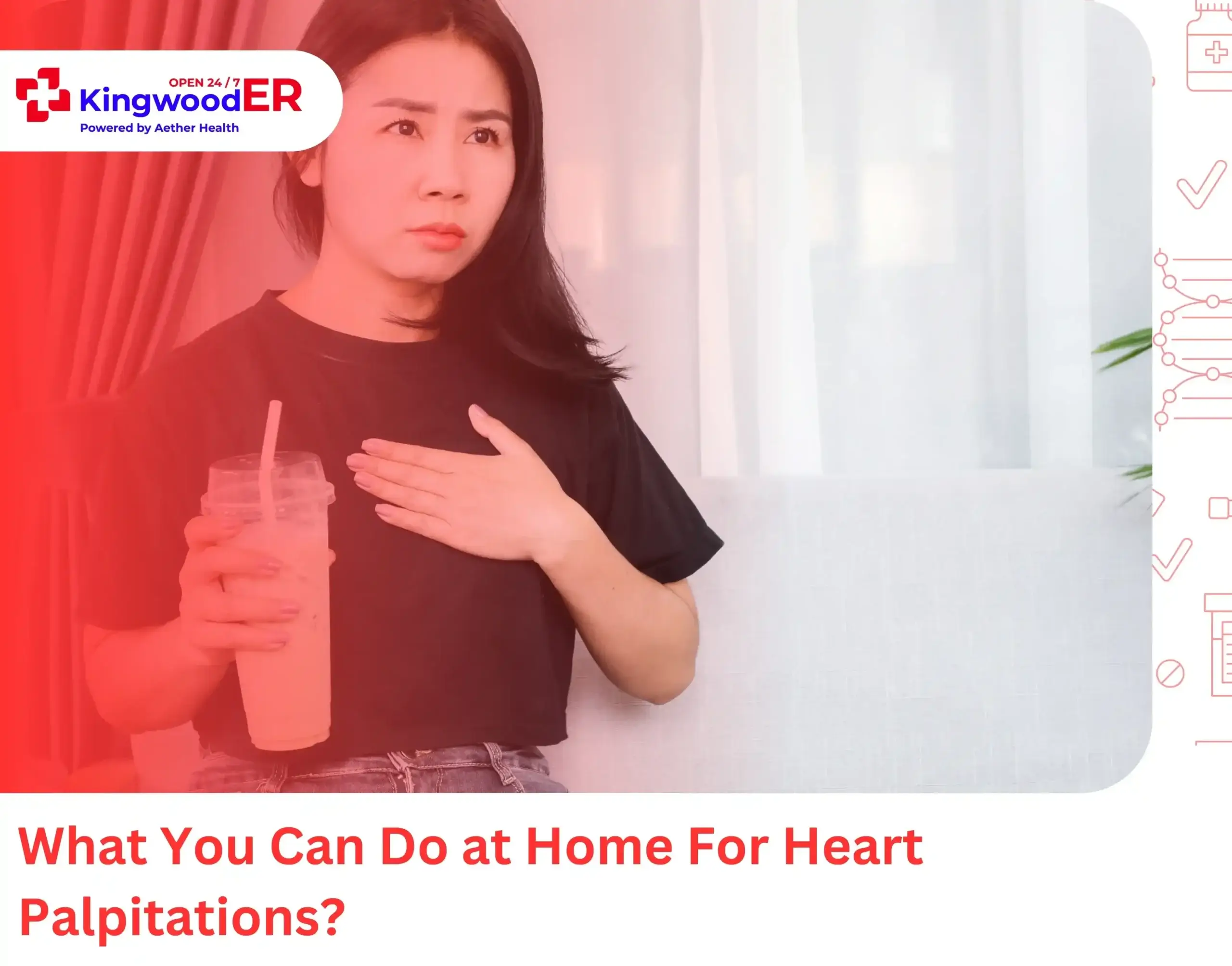
For mild signs of heart palpitations, try these simple steps:
- Stay calm and breathe – Slow, deep breaths can ease anxiety.
- Cut back on triggers – Limit caffeine, alcohol, and stress.
- Stay hydrated – drink water and eat foods rich in potassium and magnesium.
- Keep a log – Note when palpitations occur and what you were doing at the time.
- Know when to call a doctor – Frequent, long-lasting, or unusual palpitations should be evaluated by a doctor.
Final Thoughts
Most signs of heart palpitations are harmless and pass quickly. But if they come with chest pain, fainting, or shortness of breath, seek help immediately.
At ER Kingwood, our team is here for you 24/7. Our medical team quickly evaluates symptoms and performs tests to assess heart rhythm. With onsite labs and advanced imaging services, we identify structural or cardiovascular concerns that may be contributing to palpitations.
FAQs
1. Are heart palpitations always dangerous?
No, many palpitations are harmless that are caused by stress, caffeine, or lack of sleep, and typically resolve on their own.
2. When should I worry about heart palpitations?
Go to the ER right away if palpitations are paired with chest pain, dizziness, fainting, shortness of breath, or if they last longer than a few seconds and feel very strong.
3. What do heart palpitations feel like?
Heart palpitations often feel like your heart is racing, pounding, fluttering, skipping beats, or beating harder than usual. Some people describe it as a “flip-flop” or “flutter” in the chest.
4. Can anxiety cause signs of heart palpitations?
Yes. Anxiety and stress release adrenaline, which can speed up your heartbeat and trigger palpitations. These are usually harmless but can feel intense.
5. What triggers heart palpitations the most?
Common triggers include stress, caffeine, alcohol, nicotine, dehydration, lack of sleep, and hormonal changes. Certain medications or medical conditions like thyroid disease, can also cause them.
6. Can heart palpitations happen at night?
Yes. Many people notice palpitations more at night when lying down, because they are more aware of their heartbeat in a quiet setting.
7. Do heart palpitations mean I have heart disease?
Not always. But if you have risk factors like high blood pressure, diabetes, or a family history of heart disease, it’s important to get evaluated.

